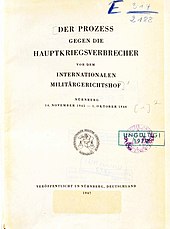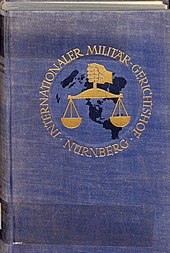International Military Tribunal
The International Military Tribunal (IMG), English: International Military Tribunal (IMT) was an ad hoc erected Criminal Court and was after the Second World War by the Allied victors established. The main seat of the tribunal was Berlin, the proceedings against the main war criminals took place in Nuremberg from autumn 1945 . The IMG served as a model for the International Military Tribunal for the Far East, which was established six months later in Tokyo . The International Military Tribunal is the legal historical forerunner of the ad hoc criminal tribunals for the former Yugoslavia and Rwanda as well as the permanent International Criminal Court established in The Hague in 1998 . Its establishment is considered the hour of birth of international criminal law .
background
During the Second World War, the Allies decided the anti-Hitler coalition , the main responsible Nazis in the German Reich to justice. At the conference in San Francisco at the beginning of May 1945, the proposal was made to bring the main war criminals who had not yet been named before an international military tribunal of the four victorious powers. After the German surrender from May 7 to 9, 1945, the victorious powers USA, USSR, Great Britain and France decided on August 8, 1945 in London to establish an international military tribunal.
For the first time in history, an international court was established to punish violations of international law . The Nuremberg trial of the main war criminals took place in the Nuremberg Palace of Justice from November 20, 1945 to October 1, 1946 .
The Constitution ( London Statute ) of the IMT, Article 1, begins with:
“In execution of the Agreement of August 8, 1945 between the Government of the United Kingdom of Great Britain and Northern Ireland, the Government of the French Republic and the Government of the Union of Soviet Socialist Republics, an International Military Tribunal is to be established for the just and expeditious trial and punishment of the major war criminals of the European axis. "
The IMT was responsible for the following actions:
According to Article 26 of the Staff Regulations, the judgments were “final and non-appealable”.
Judge
- For Great Britain: Sir Geoffrey Lawrence , he was chairman of the IMT. His deputy was Norman Birkett .
- For France: Henri Donnedieu de Vabres , Robert Falco was deputy .
- For the USSR: Iona Nikitchenko , deputy Alexander F. Woltschkow .
- For the USA: Francis Biddle and John J. Parker on their behalf .
Chief Prosecutor
- For Great Britain: Sir Hartley Shawcross
- For France: François de Menthon , later: Auguste Champetier de Ribes .
- For the USSR: Roman A. Rudenko
- For the USA: Robert H. Jackson
Procedure
Documents
- International Military Court of Nuremberg: The Trial of the Major War Criminals Volume 1–20. Negotiation minutes . Nuremberg 1947 ( digitized version )
literature
- Jürgen Weber: On the way to the Republic 1945–1947 . Munich 1981.
- Heiko Ahlbrecht: History of international criminal justice in the 20th century , 1999, ISBN 978-3-8305-0412-2 .
- Gerhard Werle (Ed.): Völkerstrafrecht , 3rd edition, 2012, ISBN 978-3-16-151837-9 .
- Nuremberg Human Rights Center , Ed .: The International Military Tribunal of Nuremberg 1945/1946. The speeches of the main prosecutors. Re-read and commented. Edited by Rainer Huhle, Lilia Antipow, Otto Böhm, Matthias Gemählich. Publisher as Hg., Nuremberg 2015 ISBN 978-3-86393-067-7 . Again Federal Agency for Civic Education BpB, Bonn 2015 ISBN 978-3-8389-0658-4 .
- Thomas Darnstädt : Nuremberg. Crimes against humanity in court 1945. Piper, Munich 2015 ISBN 3-492-05684-9 (popular science).
Web links
- Legal bases of the International Military Tribunal
- Trial documents and judgment of the International Military Tribunal
Individual evidence
- ↑ Gerhard Werle (Ed.): Völkerstrafrecht , 3rd edition, 2012, ISBN 978-3-16-151837-9 , Rn. 15th
- ^ Arieh J. Kochavi: Prelude to Nuremberg: Allied War Crimes Policy and the Question of Punishment . University of North Carolina 1998, ISBN 0-8078-2433-X , pp. 220 f.
- ↑ a b Statute for the International Military Tribunal ( page no longer available , search in web archives ) Info: The link was automatically marked as defective. Please check the link according to the instructions and then remove this notice. (PDF; 23 kB)



